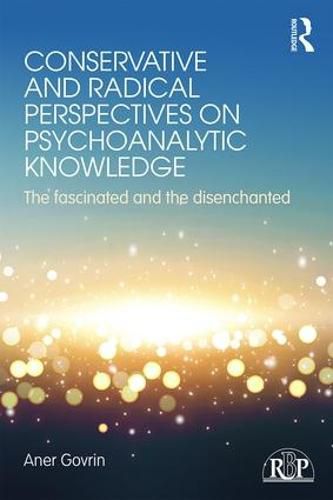Readings Newsletter
Become a Readings Member to make your shopping experience even easier.
Sign in or sign up for free!
You’re not far away from qualifying for FREE standard shipping within Australia
You’ve qualified for FREE standard shipping within Australia
The cart is loading…






Psychoanalysis really should not exist today. Until a few years ago, most of the evidence suggested that its time was drawing to a close, and yet psychoanalysis demonstrated remarkable resilience in the face of criticism, alongside significant resurgence over the course of the last years. In Conservative and Radical Perspectives on Psychoanalytic Knowledge: The Fascinated and the Disenchanted psychoanalyst and philosopher Aner Govrin describes the mechanisms of sociology within the psychoanalytic community which have enabled it to withstand the hostility levelled at it and to flourish as an intellectual and pragmatic endeavour. He defends the most criticized aspect of psychoanalysis: the fascination of analysts with their theories. Govrin demonstrates that fascination is a common phenomenon in science and shows its role in the evolution of psychoanalysis.
Govrin argues that throughout its history, psychoanalysis has successfully embraced an amalgam of what he has defined and termed fascinated and troubled communities. A fascinated community is a group that embraces a psychoanalytic theory (such as Bion’s, Klein’s, Winnicott s) as one embraces truth. A troubled community is one that is not satisfied with the state of psychoanalytic knowledge and seeks to generate a fundamental change that does not square with existing traditions (such as new psychoanalytic schools, scientifically troubled communities and the relational approach).
It is this amalgam and the continuous tension between these two groups that are responsible for psychoanalysis’ rich and varied development and for its ability to adapt to a changing world. Clinical vignettes from the work of Robert Stolorow, Betty Joseph, Antonino Ferro and Michael Eigen illustrate the dynamic by which psychoanalytic knowledge is formed. Conservative and Radical Perspectives on Psychoanalytic Knowledge will be of interest to psychoanalysts, psychotherapists and philosophers alike.
$9.00 standard shipping within Australia
FREE standard shipping within Australia for orders over $100.00
Express & International shipping calculated at checkout
Psychoanalysis really should not exist today. Until a few years ago, most of the evidence suggested that its time was drawing to a close, and yet psychoanalysis demonstrated remarkable resilience in the face of criticism, alongside significant resurgence over the course of the last years. In Conservative and Radical Perspectives on Psychoanalytic Knowledge: The Fascinated and the Disenchanted psychoanalyst and philosopher Aner Govrin describes the mechanisms of sociology within the psychoanalytic community which have enabled it to withstand the hostility levelled at it and to flourish as an intellectual and pragmatic endeavour. He defends the most criticized aspect of psychoanalysis: the fascination of analysts with their theories. Govrin demonstrates that fascination is a common phenomenon in science and shows its role in the evolution of psychoanalysis.
Govrin argues that throughout its history, psychoanalysis has successfully embraced an amalgam of what he has defined and termed fascinated and troubled communities. A fascinated community is a group that embraces a psychoanalytic theory (such as Bion’s, Klein’s, Winnicott s) as one embraces truth. A troubled community is one that is not satisfied with the state of psychoanalytic knowledge and seeks to generate a fundamental change that does not square with existing traditions (such as new psychoanalytic schools, scientifically troubled communities and the relational approach).
It is this amalgam and the continuous tension between these two groups that are responsible for psychoanalysis’ rich and varied development and for its ability to adapt to a changing world. Clinical vignettes from the work of Robert Stolorow, Betty Joseph, Antonino Ferro and Michael Eigen illustrate the dynamic by which psychoanalytic knowledge is formed. Conservative and Radical Perspectives on Psychoanalytic Knowledge will be of interest to psychoanalysts, psychotherapists and philosophers alike.